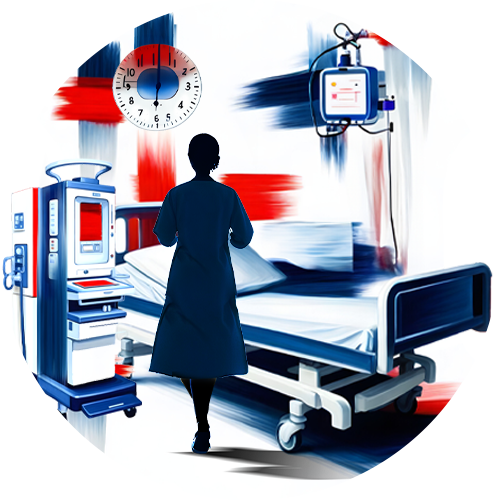On Call: Chapter 3 — Jeopardy
| April 16, 2024“Shabbos is Shabbos,” he said with finality. “Shabbos comes first. Looking for heterim is not the proper approach”

As told to Shoshana Gross
T
he phone explodes in my ear, jarring me awake in a shrill tidal wave of noise. Almost mechanically I start to reach for it when the realization strikes — “Shabbos!” Why is my phone ringing? Through bleary eyes, the name of the chief, our senior resident at the hospital, flashes on my caller ID. She knows it’s Shabbos, and I’m supposed to be off this weekend… but the jeopardy!
Heart sinking, I remember that Estelle, a fellow resident, had asked me the week before if I could take over her Saturday night jeopardy. Any resident on jeopardy is the substitute if something happens to a resident or doctor who’s supposed to be on call. It rarely happens, but this phone call means the person I’m replacing as jeopardy is on duty.
“Sorry, Dr. Rubin,” the chief tells me when I answer. “But we need you here as a replacement. Be here by six a.m.”
I let my groggy husband know. “I’ll take an Uber. I need my things with me, and carrying is a d’Oraisa.” He nods, and I begin to dress in the semidarkness.
When I was finished my fourth year in med school, I called my rav, Rabbi Friedman, with an important sh’eilah.
“I’m going to be starting my residency program in August,” I told him. “What are the heterim for working on Shabbos?”
“There are no heterim,” he replied sternly.
The earth shifted. How was I supposed to make residency work if I couldn’t be there on Shabbos? Was Rabbi Friedman serious?
“Shabbos is Shabbos,” he said with finality. “Shabbos comes first. Looking for heterim is not the proper approach.” He paused. “Of course, there’s pikuach nefesh, which allows us to save Jews on Shabbos. And a complex concept called aiva is what allows you to save non-Jews on Shabbos. But try to avoid working on Shabbos if you can.”
After going over the relevant halachos thoroughly, I was humbled. With Yaakov’s approval, I offer to trade shifts with other residents — and to pay them for the switch. The thousands we spend for Shabbos are a sacrifice we are more than willing to make.
Now, watching the silent streets slip past the windows of the Uber, I acknowledge that it doesn’t always work.
“We’re here,” the Uber driver says impatiently as he opens the door to let me out, and I pass from the chilly autumn air into the sterile, antiseptic atmosphere of the ER.
Weekends are generally more hectic, and tonight is no exception, with injured revelers and victims of a gang shootout from Chicago’s South Side. In the midst of the chaos, the attending doctor isn’t feeling well and has to leave suddenly.
I’ve just finished supervising a tech putting a cast on a broken arm when one of the night nurses, Eileen, rushes over, her normally calm eyes full of concern.
“Dr. Rubin, I need your help with the patient in Room 7. He’s one of the attending’s patients, and I can’t get an IV line; his veins are very hard. Can you bring the ultrasound machine? It’s a serious case — diabetic ketoacidosis — and he keeps insisting that he wants to leave.”
“I’ll be there in a moment,” I say reassuringly. With a portable ultrasound machine in tow, I knock gently on the door to Room 7 and step inside.
The heavy young man on the table is pale and sweaty, panting heavily. There’s a well-known medical rule — if your patient is sweating, you should be, too.
“I’m gonna leave,” he growls, running a hand over his shaved head. “You’re not sticking me anymore, and I’m not staying in this place.”
“My name is Dr. Rubin,” I say soothingly. “I understand that the nurse tried to put in an IV line a few times, and that can be painful, but with this ultrasound machine, we’ll find your vein quickly, and you’ll be fine.”
He still looks sulky, but at least he’s not barging past me. I do a quick assessment and notice the telltale fruity-smelling breath as I come closer. Diabetic ketoacidosis is a serious complication of diabetes, where acid builds up in the blood, and can cause swelling in the brain. It’s not something to play around with. This patient needs to get to the ICU immediately, but to transfer him, we need an IV.
Applying gel on his arm before using the venous ultrasound, I suddenly notice what’s on his hands: bold, black swastikas. And his arms… right where I’m going to place the gel, are lightning bolts, a leering, empty-eyed skull, and the initials: SS.
I’m frozen, staring at the black ink on his chalky white skin… seeing another arm, a smaller, older arm, with a straggling line of blue numbers tattooed onto the flesh.
My grandparents were survivors, and I’ve grown up with stories of their years in the death camps. My visceral reaction is to flinch and step away.
“Will it hurt?” My gaze snaps back to the patient’s face, and I see the uncertainty in his eyes, the fear. “Because if it will, I’m going. You can’t make me stay here!”
I know one thing: If he leaves without treatment, he’s not going to survive.
The irony is exquisite — a frum Jew, dragged out of bed on Shabbos, to make sure that a neo-Nazi skinhead doesn’t die…. I’m here because of aiva, to prevent hatred of Jews, and I’m going to treat an anti-Semite.
“If you leave, you’re going to die,” I tell him bluntly. “Let me start treatment.”
“I don’t want to die,” he whispers. I carefully smear the gel on his SS tattoo and use the ultrasound machine to gently guide the needle into the proper vein. Lifegiving fluid flows, right through the skull’s dark eye sockets.
Will saving this man ultimately help other Jews? I don’t know, but I can hope.
And I do what needs to be done.
Because I’m a doctor, and doctors are supposed to heal.
The characters in this series are composites; all the stories are true.
The halachos of residency and Shabbos are varied and complicated. One should consult with their posek before making any decisions.
(Originally featured in Family First, Issue 890)
Oops! We could not locate your form.


